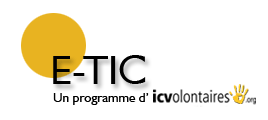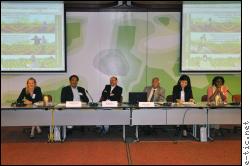ICTs for Africa RoundtableExamples from Agriculture, Health and the Textile Sector 27 September 2012 On 21st September 2012, five years to the day since the launch of the initial idea of the E-TIC program, concrete results were presented at the International Conference Center of Geneva on the use of information and communication technologies (ICTs) in rural areas of Senegal, Mali and Uganda, more specifically in the fields of agriculture and health. Speakers, both physically present at the International Conference Center of Geneva and others calling in from Senegal, Uganda, Canada (Mali) and Italy, shared their experiences and good practices. At the heart of the discussion was the inclusion of oral communities through a multimedia approach, tackling issues such as organic farming, health problems due to the unprotected use of pesticides and more. Also discussed were WSIS+10 and the stocktaking work done by ITU. A new project, related to the textile industry of Ghana was also presented. The roundtable ended with a discussion about the ingredients needed to build successful partnerships for development-related ICT projects. The events were organized by ICVolunteers, an international non-profit organization, with the support of technical partners and the Organisation Internationale de la Francophonie (OIF). ProgramInterpretation English-French 14:00 – 14:20: Welcome Conference
14:20 – 15:30 Ongoing Initiatives: Communication, ICT and Development
This session will focus on concrete projects related to knowledge sharing, ICT and development within various sectors in Africa. The speakers shared their experiences, with a particular focus on the “E-TIC: Sahel InfoHubs project” related to agriculture, fishing and husbandry. The session also presented the experience of Bwindi National Park and its telecenter in Uganda and the Ethical Fashion project, starting in Ghana. -- 15 minute Coffee Break --
The starting point of this session was the experiences of the work done in the development of AgriGuide.The question of the use of pesticides, environmentally respectful practices and organic farming as well as the proper use of relevant communication tools were at the heart of the discussion. 17: 00 – 17:45 What are the ingredients for future projects and partnerships - requirements, interests and needs
To let projects such as E-TIC.net succeed, long-term partnerships and collaborations with financing institutions are essential. What are the criteria today? What are the challenges and opportunities, and how to work with the private sector and foundations? 17:45-18:00 Conclusions and Next Steps Expected ResultsBuilding “win-win” partnerships and solutions, involving academic institutions, non-governmental and international organizations, as well as other partners such as the private sector. Posted: 2012-9-27 Updated: 2012-9-27 |


